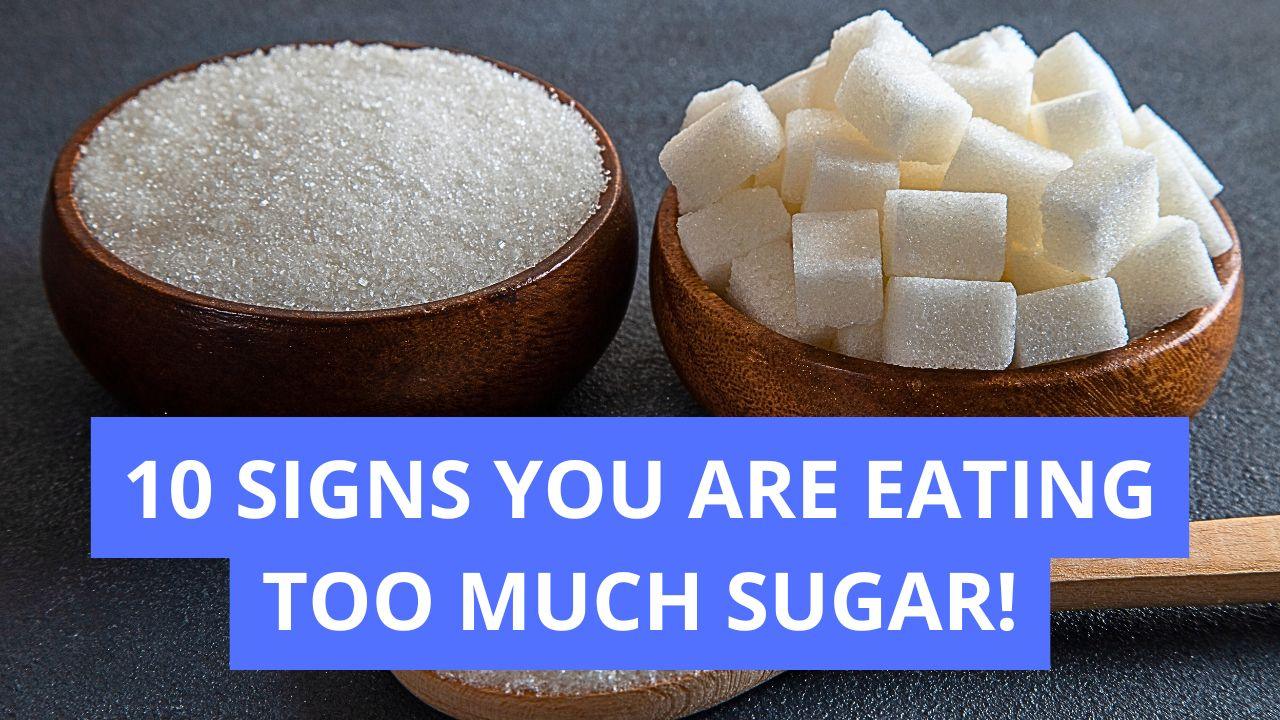Sugar is a staple in our diets, often hidden in foods we wouldn’t suspect. While it can be a delightful treat, the reality is that most of us consume far more sugar than is healthy. In fact, the average American consumes over 77 grams of sugar per day, which is more than triple the recommended amount! But how can you tell if you’re overdoing it? In this article, we’ll explore 10 signs that indicate you might be eating too much sugar and provide tips on how to cut back without feeling deprived. Let’s jump in!
Table of Contents
1. Constant Fatigue and Low Energy
One of the most common signs of excessive sugar intake is feeling constantly tired. You might think that sugar gives you energy, but in reality, it creates a spike in your blood sugar levels, followed by a sharp drop, leaving you feeling more exhausted than before. This cycle of energy highs and lows can leave you feeling drained and lethargic throughout the day.
How to Fix It:
- Start by reducing the amount of sugary snacks you consume. Opt for complex carbohydrates like whole grains, which provide a more stable source of energy.
- Incorporate more protein into your meals to help balance your blood sugar levels.
- Stay hydrated and avoid sugary drinks, which can contribute to energy crashes.
2. Increased Cravings for Sweets and Carbs
Have you noticed that the more sugar you eat, the more you crave it? This is because sugar can be addictive, triggering a cycle where your body constantly seeks out more sweets. Over time, this can lead to an uncontrollable urge to eat sugary foods and refined carbs, even when you’re not hungry.
How to Fix It:
- Try to identify and eliminate hidden sugars in your diet by reading food labels carefully.
- Gradually reduce the amount of sugar you consume, allowing your taste buds to adjust.
- Replace sugary snacks with fruits, which offer natural sweetness and important nutrients.
3. Weight Gain and Difficulty Losing Weight
Sugar is packed with empty calories that contribute to weight gain, particularly around the abdomen. It also affects your hormones, specifically insulin, which plays a crucial role in fat storage. Consuming too much sugar can make it difficult to lose weight, even with a healthy diet and exercise routine.
How to Fix It:
- Cut back on sugary beverages like sodas and fruit juices, which are major sources of empty calories.
- Focus on eating whole, unprocessed foods that are naturally low in sugar.
- Include regular physical activity in your routine to help regulate your metabolism and burn excess fat.
4. Frequent Mood Swings and Irritability
If you find yourself experiencing frequent mood swings or irritability, it might be due to your sugar consumption. Sugar causes rapid fluctuations in blood sugar levels, which can lead to feelings of anxiety, irritability, and even depression.
How to Fix It:
- Reduce your intake of refined sugars and opt for whole foods that provide steady energy.
- Incorporate foods rich in omega-3 fatty acids, like fish and flaxseeds, which can help stabilize your mood.
- Practice stress-reducing activities like meditation, which can help curb sugar cravings and improve emotional well-being.
5. Skin Problems, Including Acne and Wrinkles
Too much sugar in your diet can wreak havoc on your skin. High sugar levels can lead to inflammation, which can cause acne breakouts and accelerate the aging process, leading to wrinkles and sagging skin. Additionally, sugar damages collagen and elastin, the proteins that keep your skin firm and youthful.
How to Fix It:
- Cut down on sugary foods and beverages that contribute to inflammation.
- Drink plenty of water to help flush out toxins and keep your skin hydrated.
- Incorporate antioxidant-rich foods like berries and leafy greens to support skin health.
6. Increased Risk of Cavities and Gum Disease
Sugar is a major culprit in the development of cavities and gum disease. When you consume sugary foods, the bacteria in your mouth feed on the sugar, producing acid that erodes your tooth enamel. Over time, this can lead to cavities, gum disease, and even tooth loss.
How to Fix It:
- Brush your teeth twice a day and floss daily to remove plaque and food particles.
- Limit your intake of sugary foods and drinks, especially those that stick to your teeth.
- Visit your dentist regularly for check-ups and cleanings.
7. High Blood Pressure and Cholesterol Levels
Excessive sugar consumption is linked to an increased risk of heart disease. Sugar can raise your blood pressure and increase levels of LDL cholesterol, the “bad” cholesterol that contributes to plaque buildup in your arteries. Over time, this can lead to heart disease, stroke, and other cardiovascular issues.
How to Fix It:
- Reduce your intake of added sugars by avoiding processed foods and sugary drinks.
- Incorporate heart-healthy foods like oats, nuts, and fish into your diet.
- Maintain a regular exercise routine to help manage your blood pressure and cholesterol levels.
8. Digestive Issues, Including Bloating and Gas
Eating too much sugar can disrupt your digestive system, leading to issues like bloating, gas, and even diarrhea. Sugar can feed harmful bacteria in your gut, leading to an imbalance in your gut flora and digestive discomfort.
How to Fix It:
- Cut back on foods high in sugar, especially those that contain high-fructose corn syrup.
- Include more fiber-rich foods in your diet, such as fruits, vegetables, and whole grains, to support healthy digestion.
- Consider taking a probiotic supplement to help restore balance to your gut bacteria.
9. Frequent Infections and Weakened Immunity
Too much sugar can weaken your immune system, making you more susceptible to infections like colds, flu, and other illnesses. Sugar can impair the function of your white blood cells, which are essential for fighting off infections.
How to Fix It:
- Reduce your sugar intake, especially during cold and flu season.
- Boost your immune system with nutrient-rich foods like garlic, ginger, and citrus fruits.
- Get plenty of sleep and manage stress to keep your immune system strong.
10. Difficulty Concentrating and Memory Problems
Sugar can also affect your brain function. High sugar levels can lead to brain fog, making it difficult to concentrate or remember things. Over time, excessive sugar consumption may even increase your risk of developing cognitive impairments like Alzheimer’s disease.
How to Fix It:
- Focus on a balanced diet rich in brain-boosting foods like nuts, seeds, and dark leafy greens.
- Limit your intake of sugary foods and drinks, especially those that cause rapid spikes in blood sugar.
- Stay mentally active by engaging in puzzles, reading, and other cognitive activities.
Conclusion:
Recognizing the signs of excessive sugar consumption is the first step towards better health. If you’re experiencing any of the symptoms we’ve discussed, it might be time to take a closer look at your diet. Reducing your sugar intake doesn’t mean giving up sweetness entirely, but rather finding a healthier balance that supports your overall well-being. Start small, make gradual changes, and soon you’ll feel the benefits of a lower-sugar lifestyle. Ready to take control of your health? Begin by making one simple swap today!





